Strategic Management: Globalization, Ethics, Culture, and Finance
VerifiedAdded on 2022/10/12
|10
|2736
|173
Essay
AI Summary
This essay delves into the multifaceted relationship between strategic management, globalization, ethics, culture, and financialization. It argues that strategic planning is not neutral and is significantly influenced by globalization, which often prioritizes financialization, potentially impacting organizational culture and ethical standards. The essay examines how globalization affects ethical considerations in business, the impact of financialization on organizational culture, and the practices of ethics and culture in a globalized environment. It highlights the challenges faced by medium-sized companies in expanding globally, often becoming trapped in financial cycles and potentially losing employees due to job dissatisfaction. The author critiques the concept of ethical standards and argues that these standards are different from those followed by globalization and financialization.
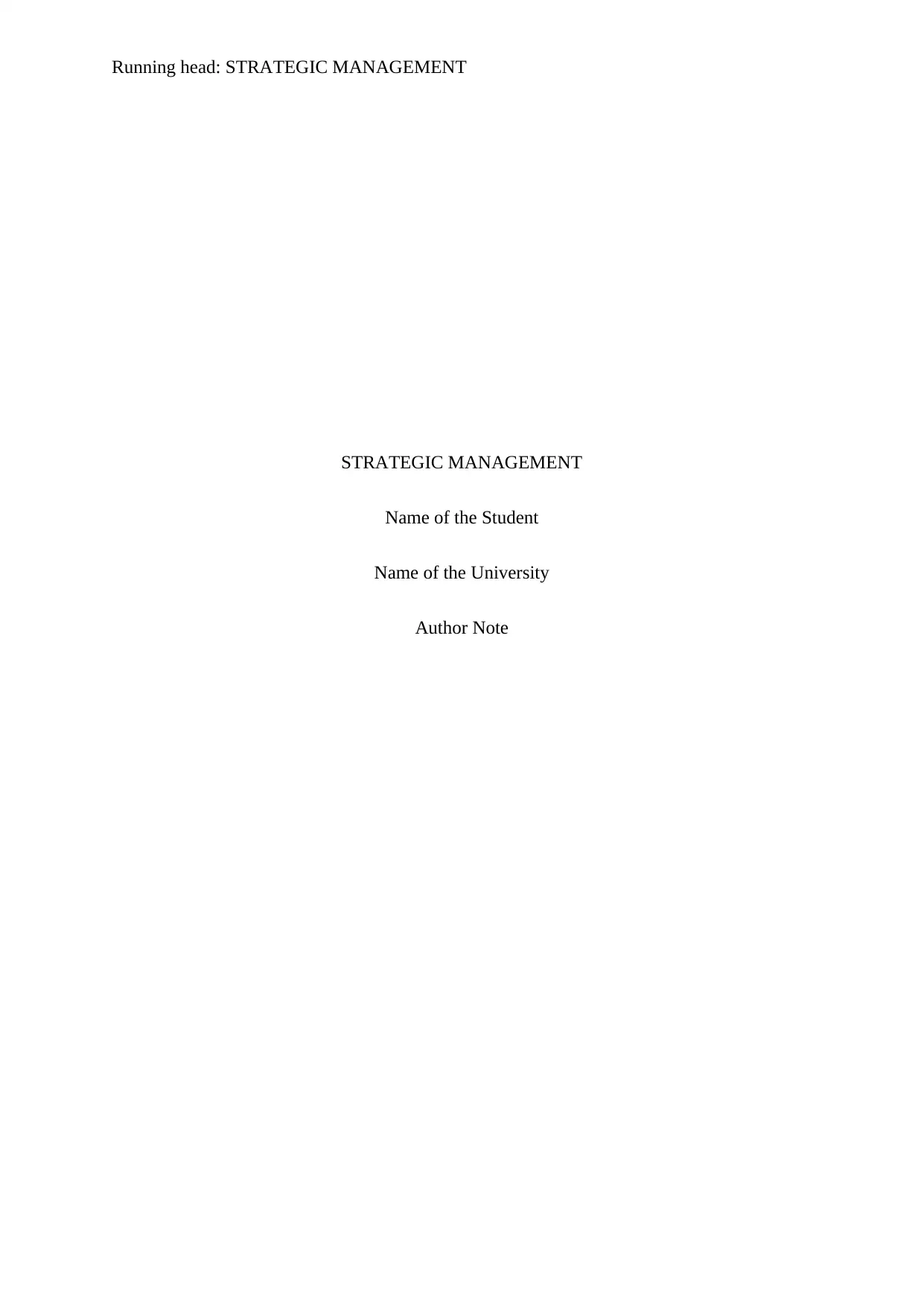
Running head: STRATEGIC MANAGEMENT
STRATEGIC MANAGEMENT
Name of the Student
Name of the University
Author Note
STRATEGIC MANAGEMENT
Name of the Student
Name of the University
Author Note
Paraphrase This Document
Need a fresh take? Get an instant paraphrase of this document with our AI Paraphraser
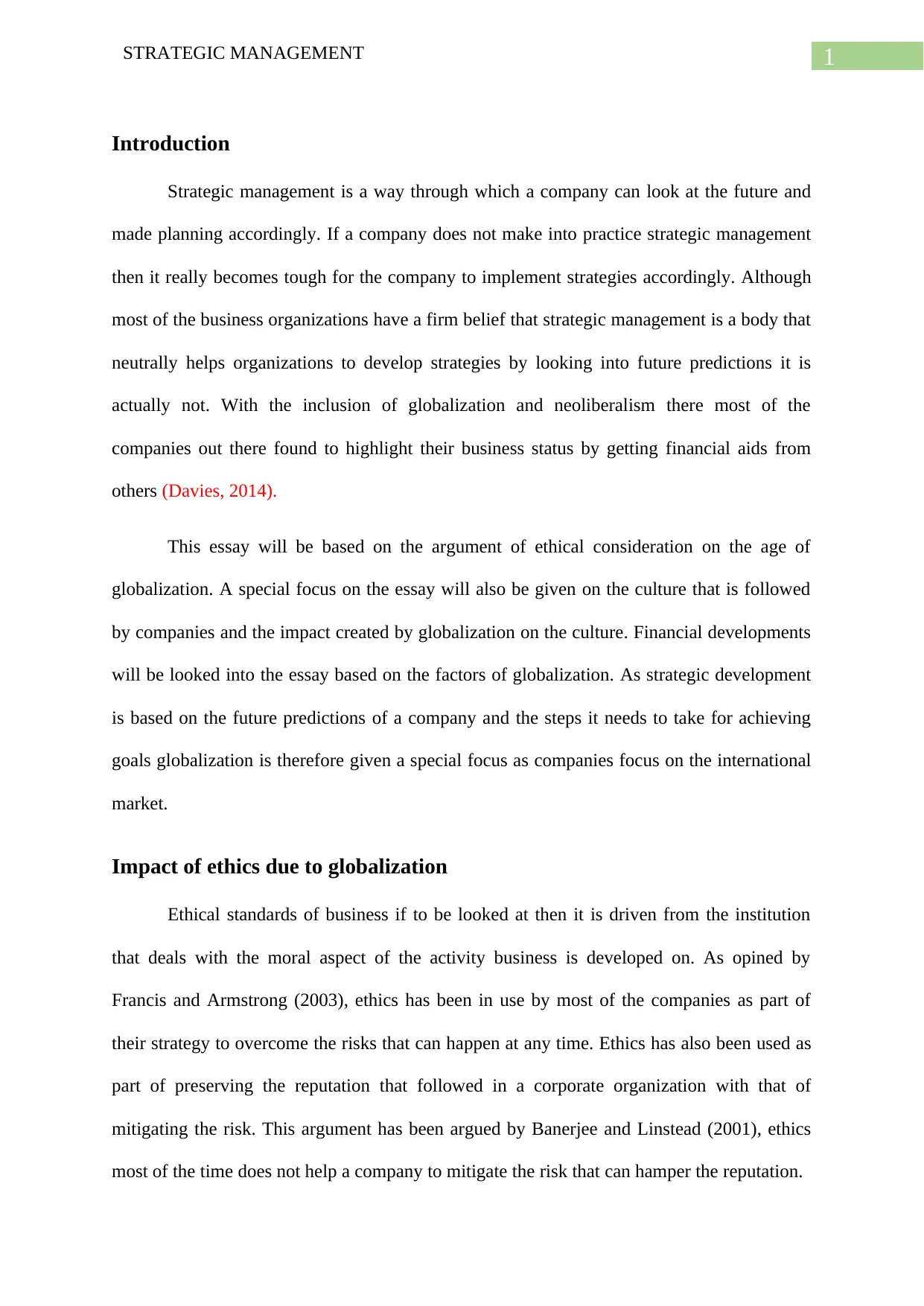
1STRATEGIC MANAGEMENT
Introduction
Strategic management is a way through which a company can look at the future and
made planning accordingly. If a company does not make into practice strategic management
then it really becomes tough for the company to implement strategies accordingly. Although
most of the business organizations have a firm belief that strategic management is a body that
neutrally helps organizations to develop strategies by looking into future predictions it is
actually not. With the inclusion of globalization and neoliberalism there most of the
companies out there found to highlight their business status by getting financial aids from
others (Davies, 2014).
This essay will be based on the argument of ethical consideration on the age of
globalization. A special focus on the essay will also be given on the culture that is followed
by companies and the impact created by globalization on the culture. Financial developments
will be looked into the essay based on the factors of globalization. As strategic development
is based on the future predictions of a company and the steps it needs to take for achieving
goals globalization is therefore given a special focus as companies focus on the international
market.
Impact of ethics due to globalization
Ethical standards of business if to be looked at then it is driven from the institution
that deals with the moral aspect of the activity business is developed on. As opined by
Francis and Armstrong (2003), ethics has been in use by most of the companies as part of
their strategy to overcome the risks that can happen at any time. Ethics has also been used as
part of preserving the reputation that followed in a corporate organization with that of
mitigating the risk. This argument has been argued by Banerjee and Linstead (2001), ethics
most of the time does not help a company to mitigate the risk that can hamper the reputation.
Introduction
Strategic management is a way through which a company can look at the future and
made planning accordingly. If a company does not make into practice strategic management
then it really becomes tough for the company to implement strategies accordingly. Although
most of the business organizations have a firm belief that strategic management is a body that
neutrally helps organizations to develop strategies by looking into future predictions it is
actually not. With the inclusion of globalization and neoliberalism there most of the
companies out there found to highlight their business status by getting financial aids from
others (Davies, 2014).
This essay will be based on the argument of ethical consideration on the age of
globalization. A special focus on the essay will also be given on the culture that is followed
by companies and the impact created by globalization on the culture. Financial developments
will be looked into the essay based on the factors of globalization. As strategic development
is based on the future predictions of a company and the steps it needs to take for achieving
goals globalization is therefore given a special focus as companies focus on the international
market.
Impact of ethics due to globalization
Ethical standards of business if to be looked at then it is driven from the institution
that deals with the moral aspect of the activity business is developed on. As opined by
Francis and Armstrong (2003), ethics has been in use by most of the companies as part of
their strategy to overcome the risks that can happen at any time. Ethics has also been used as
part of preserving the reputation that followed in a corporate organization with that of
mitigating the risk. This argument has been argued by Banerjee and Linstead (2001), ethics
most of the time does not help a company to mitigate the risk that can hamper the reputation.
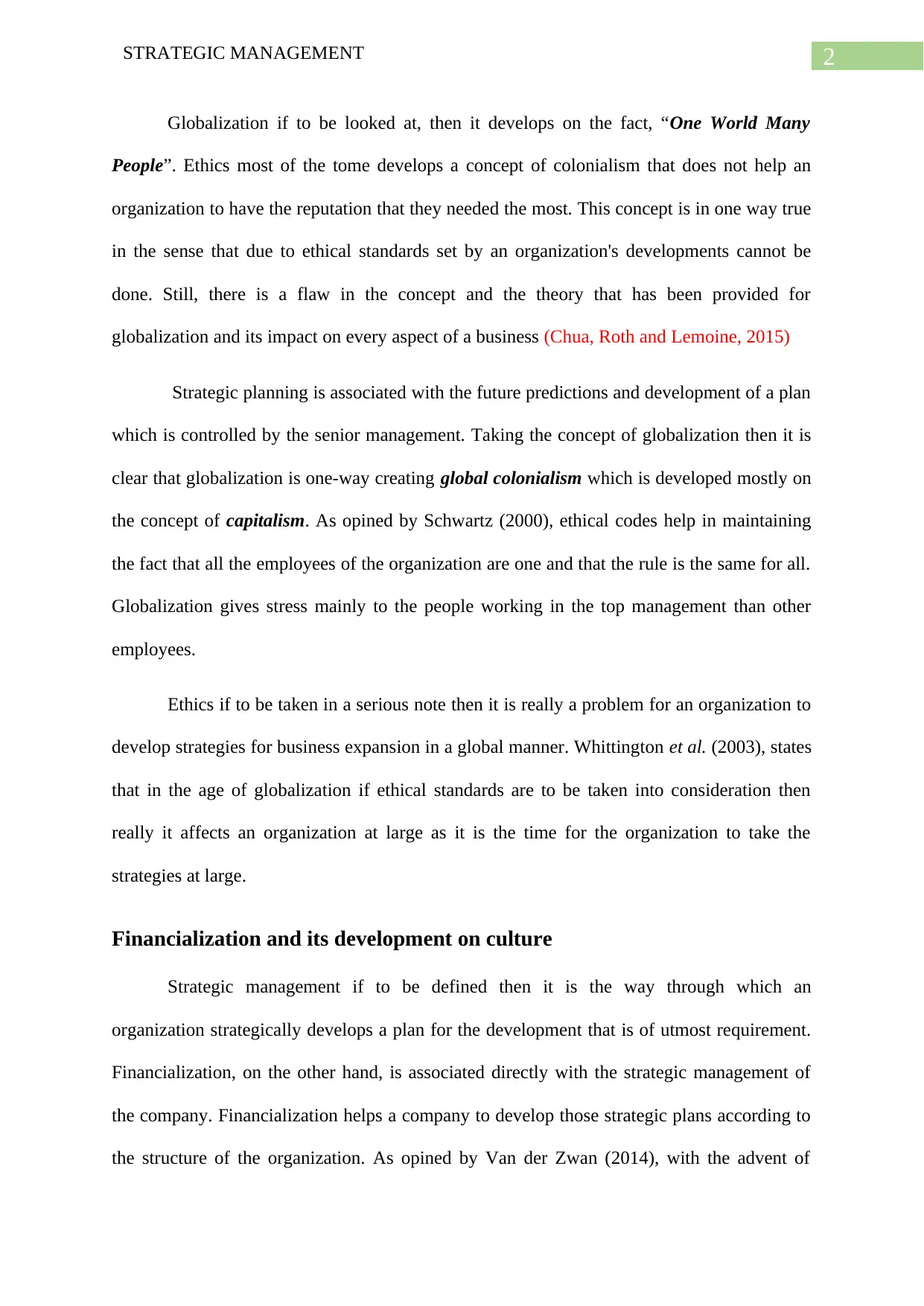
2STRATEGIC MANAGEMENT
Globalization if to be looked at, then it develops on the fact, “One World Many
People”. Ethics most of the tome develops a concept of colonialism that does not help an
organization to have the reputation that they needed the most. This concept is in one way true
in the sense that due to ethical standards set by an organization's developments cannot be
done. Still, there is a flaw in the concept and the theory that has been provided for
globalization and its impact on every aspect of a business (Chua, Roth and Lemoine, 2015)
Strategic planning is associated with the future predictions and development of a plan
which is controlled by the senior management. Taking the concept of globalization then it is
clear that globalization is one-way creating global colonialism which is developed mostly on
the concept of capitalism. As opined by Schwartz (2000), ethical codes help in maintaining
the fact that all the employees of the organization are one and that the rule is the same for all.
Globalization gives stress mainly to the people working in the top management than other
employees.
Ethics if to be taken in a serious note then it is really a problem for an organization to
develop strategies for business expansion in a global manner. Whittington et al. (2003), states
that in the age of globalization if ethical standards are to be taken into consideration then
really it affects an organization at large as it is the time for the organization to take the
strategies at large.
Financialization and its development on culture
Strategic management if to be defined then it is the way through which an
organization strategically develops a plan for the development that is of utmost requirement.
Financialization, on the other hand, is associated directly with the strategic management of
the company. Financialization helps a company to develop those strategic plans according to
the structure of the organization. As opined by Van der Zwan (2014), with the advent of
Globalization if to be looked at, then it develops on the fact, “One World Many
People”. Ethics most of the tome develops a concept of colonialism that does not help an
organization to have the reputation that they needed the most. This concept is in one way true
in the sense that due to ethical standards set by an organization's developments cannot be
done. Still, there is a flaw in the concept and the theory that has been provided for
globalization and its impact on every aspect of a business (Chua, Roth and Lemoine, 2015)
Strategic planning is associated with the future predictions and development of a plan
which is controlled by the senior management. Taking the concept of globalization then it is
clear that globalization is one-way creating global colonialism which is developed mostly on
the concept of capitalism. As opined by Schwartz (2000), ethical codes help in maintaining
the fact that all the employees of the organization are one and that the rule is the same for all.
Globalization gives stress mainly to the people working in the top management than other
employees.
Ethics if to be taken in a serious note then it is really a problem for an organization to
develop strategies for business expansion in a global manner. Whittington et al. (2003), states
that in the age of globalization if ethical standards are to be taken into consideration then
really it affects an organization at large as it is the time for the organization to take the
strategies at large.
Financialization and its development on culture
Strategic management if to be defined then it is the way through which an
organization strategically develops a plan for the development that is of utmost requirement.
Financialization, on the other hand, is associated directly with the strategic management of
the company. Financialization helps a company to develop those strategic plans according to
the structure of the organization. As opined by Van der Zwan (2014), with the advent of
⊘ This is a preview!⊘
Do you want full access?
Subscribe today to unlock all pages.

Trusted by 1+ million students worldwide
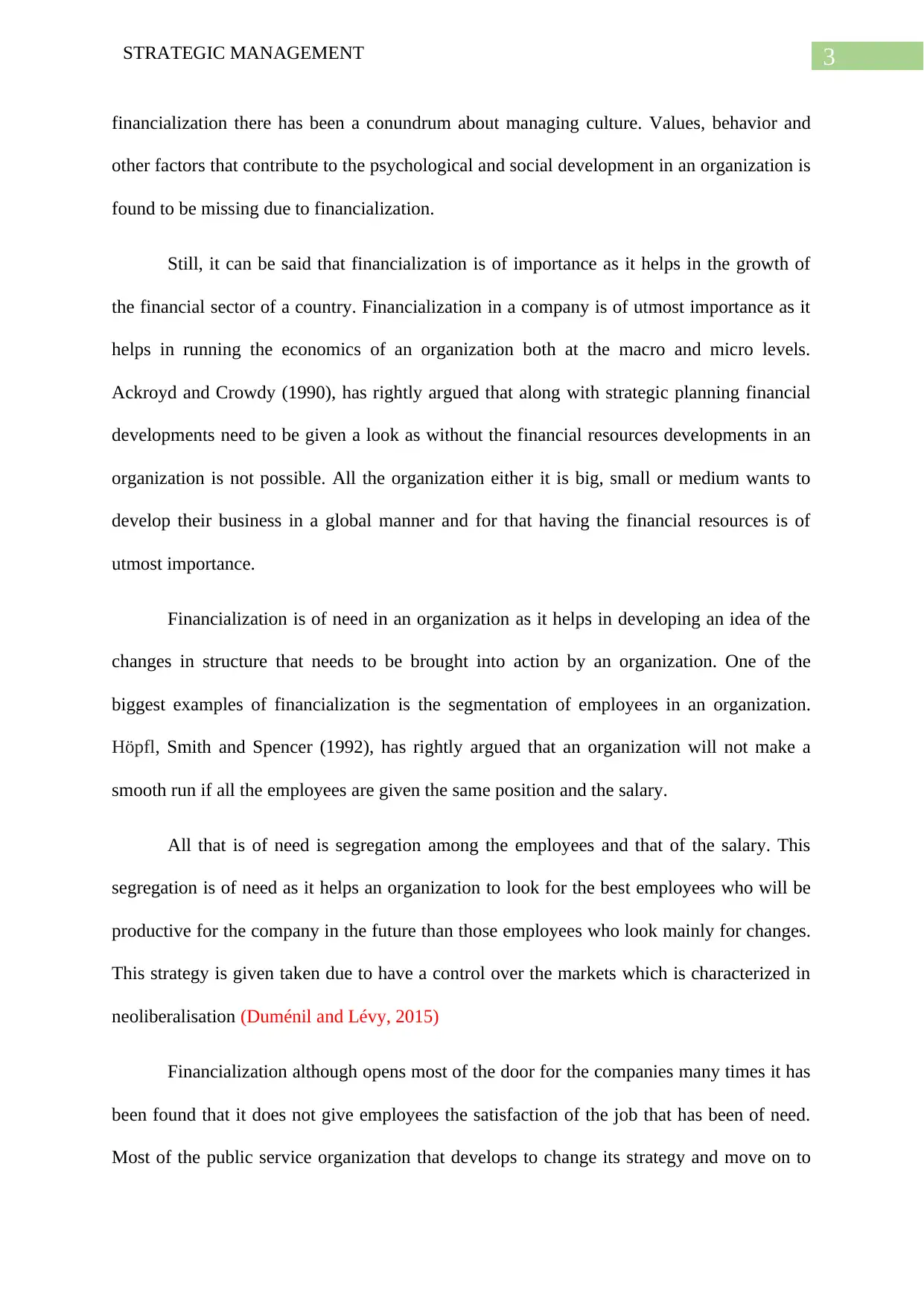
3STRATEGIC MANAGEMENT
financialization there has been a conundrum about managing culture. Values, behavior and
other factors that contribute to the psychological and social development in an organization is
found to be missing due to financialization.
Still, it can be said that financialization is of importance as it helps in the growth of
the financial sector of a country. Financialization in a company is of utmost importance as it
helps in running the economics of an organization both at the macro and micro levels.
Ackroyd and Crowdy (1990), has rightly argued that along with strategic planning financial
developments need to be given a look as without the financial resources developments in an
organization is not possible. All the organization either it is big, small or medium wants to
develop their business in a global manner and for that having the financial resources is of
utmost importance.
Financialization is of need in an organization as it helps in developing an idea of the
changes in structure that needs to be brought into action by an organization. One of the
biggest examples of financialization is the segmentation of employees in an organization.
Höpfl, Smith and Spencer (1992), has rightly argued that an organization will not make a
smooth run if all the employees are given the same position and the salary.
All that is of need is segregation among the employees and that of the salary. This
segregation is of need as it helps an organization to look for the best employees who will be
productive for the company in the future than those employees who look mainly for changes.
This strategy is given taken due to have a control over the markets which is characterized in
neoliberalisation (Duménil and Lévy, 2015)
Financialization although opens most of the door for the companies many times it has
been found that it does not give employees the satisfaction of the job that has been of need.
Most of the public service organization that develops to change its strategy and move on to
financialization there has been a conundrum about managing culture. Values, behavior and
other factors that contribute to the psychological and social development in an organization is
found to be missing due to financialization.
Still, it can be said that financialization is of importance as it helps in the growth of
the financial sector of a country. Financialization in a company is of utmost importance as it
helps in running the economics of an organization both at the macro and micro levels.
Ackroyd and Crowdy (1990), has rightly argued that along with strategic planning financial
developments need to be given a look as without the financial resources developments in an
organization is not possible. All the organization either it is big, small or medium wants to
develop their business in a global manner and for that having the financial resources is of
utmost importance.
Financialization is of need in an organization as it helps in developing an idea of the
changes in structure that needs to be brought into action by an organization. One of the
biggest examples of financialization is the segmentation of employees in an organization.
Höpfl, Smith and Spencer (1992), has rightly argued that an organization will not make a
smooth run if all the employees are given the same position and the salary.
All that is of need is segregation among the employees and that of the salary. This
segregation is of need as it helps an organization to look for the best employees who will be
productive for the company in the future than those employees who look mainly for changes.
This strategy is given taken due to have a control over the markets which is characterized in
neoliberalisation (Duménil and Lévy, 2015)
Financialization although opens most of the door for the companies many times it has
been found that it does not give employees the satisfaction of the job that has been of need.
Most of the public service organization that develops to change its strategy and move on to
Paraphrase This Document
Need a fresh take? Get an instant paraphrase of this document with our AI Paraphraser
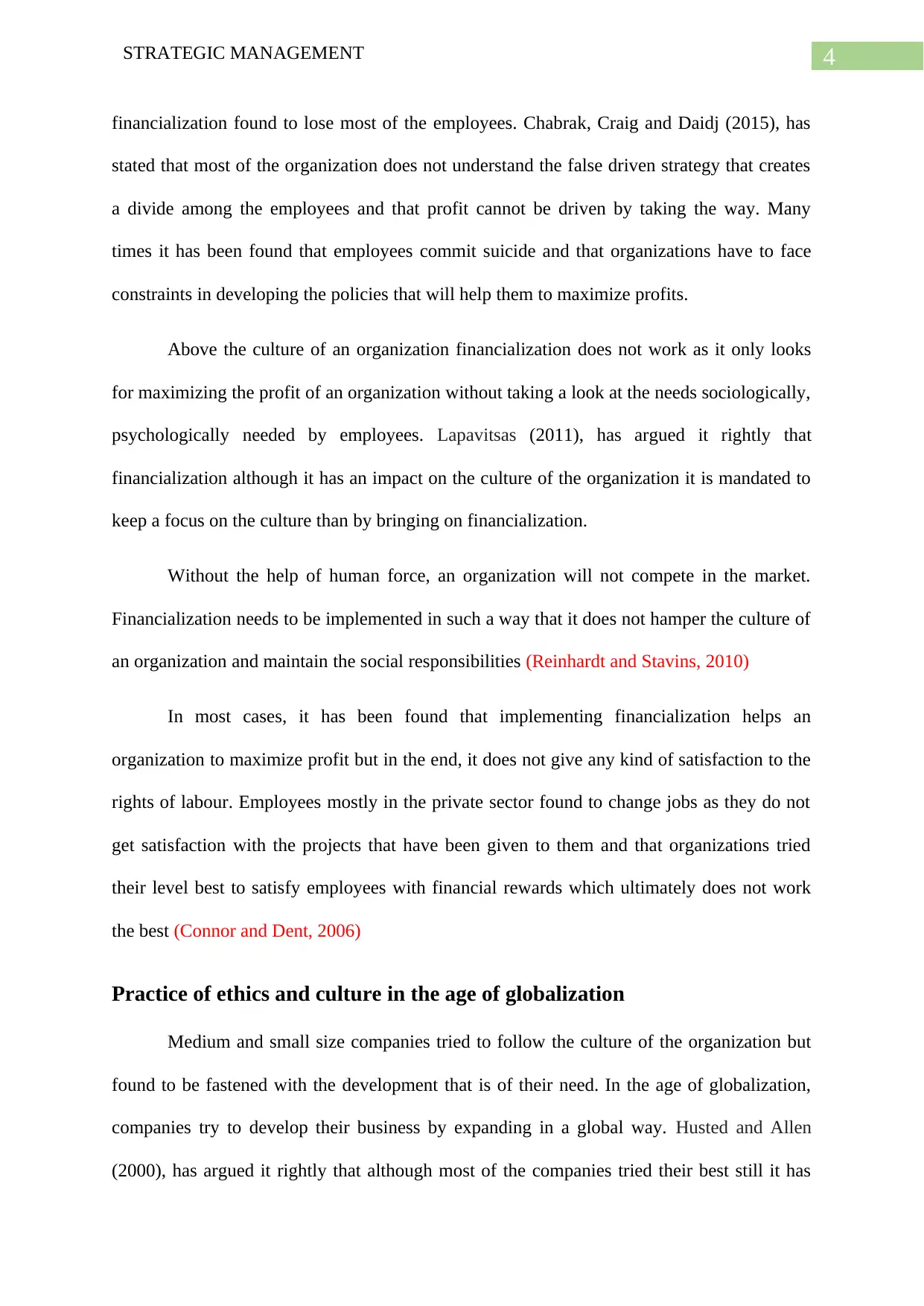
4STRATEGIC MANAGEMENT
financialization found to lose most of the employees. Chabrak, Craig and Daidj (2015), has
stated that most of the organization does not understand the false driven strategy that creates
a divide among the employees and that profit cannot be driven by taking the way. Many
times it has been found that employees commit suicide and that organizations have to face
constraints in developing the policies that will help them to maximize profits.
Above the culture of an organization financialization does not work as it only looks
for maximizing the profit of an organization without taking a look at the needs sociologically,
psychologically needed by employees. Lapavitsas (2011), has argued it rightly that
financialization although it has an impact on the culture of the organization it is mandated to
keep a focus on the culture than by bringing on financialization.
Without the help of human force, an organization will not compete in the market.
Financialization needs to be implemented in such a way that it does not hamper the culture of
an organization and maintain the social responsibilities (Reinhardt and Stavins, 2010)
In most cases, it has been found that implementing financialization helps an
organization to maximize profit but in the end, it does not give any kind of satisfaction to the
rights of labour. Employees mostly in the private sector found to change jobs as they do not
get satisfaction with the projects that have been given to them and that organizations tried
their level best to satisfy employees with financial rewards which ultimately does not work
the best (Connor and Dent, 2006)
Practice of ethics and culture in the age of globalization
Medium and small size companies tried to follow the culture of the organization but
found to be fastened with the development that is of their need. In the age of globalization,
companies try to develop their business by expanding in a global way. Husted and Allen
(2000), has argued it rightly that although most of the companies tried their best still it has
financialization found to lose most of the employees. Chabrak, Craig and Daidj (2015), has
stated that most of the organization does not understand the false driven strategy that creates
a divide among the employees and that profit cannot be driven by taking the way. Many
times it has been found that employees commit suicide and that organizations have to face
constraints in developing the policies that will help them to maximize profits.
Above the culture of an organization financialization does not work as it only looks
for maximizing the profit of an organization without taking a look at the needs sociologically,
psychologically needed by employees. Lapavitsas (2011), has argued it rightly that
financialization although it has an impact on the culture of the organization it is mandated to
keep a focus on the culture than by bringing on financialization.
Without the help of human force, an organization will not compete in the market.
Financialization needs to be implemented in such a way that it does not hamper the culture of
an organization and maintain the social responsibilities (Reinhardt and Stavins, 2010)
In most cases, it has been found that implementing financialization helps an
organization to maximize profit but in the end, it does not give any kind of satisfaction to the
rights of labour. Employees mostly in the private sector found to change jobs as they do not
get satisfaction with the projects that have been given to them and that organizations tried
their level best to satisfy employees with financial rewards which ultimately does not work
the best (Connor and Dent, 2006)
Practice of ethics and culture in the age of globalization
Medium and small size companies tried to follow the culture of the organization but
found to be fastened with the development that is of their need. In the age of globalization,
companies try to develop their business by expanding in a global way. Husted and Allen
(2000), has argued it rightly that although most of the companies tried their best still it has
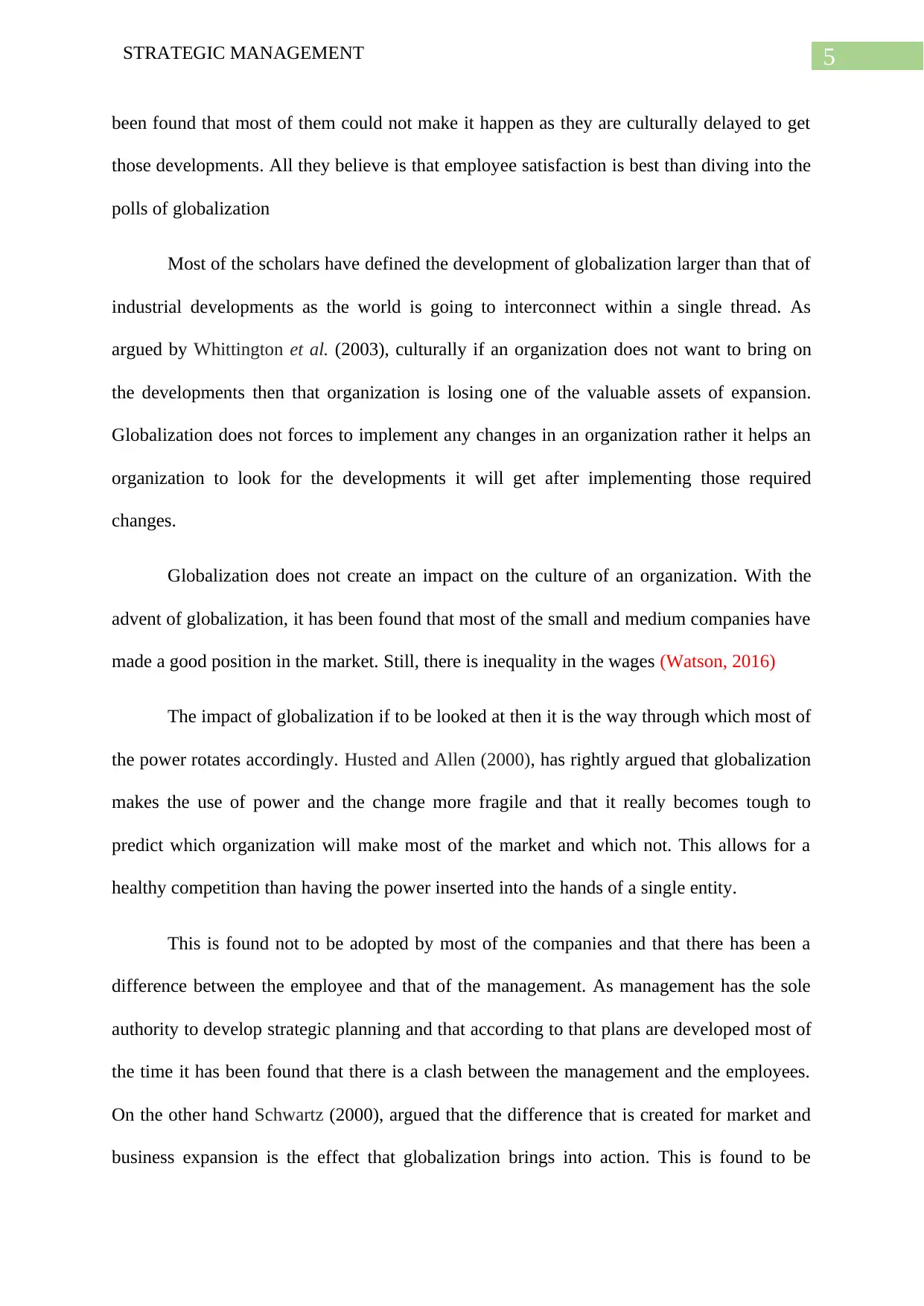
5STRATEGIC MANAGEMENT
been found that most of them could not make it happen as they are culturally delayed to get
those developments. All they believe is that employee satisfaction is best than diving into the
polls of globalization
Most of the scholars have defined the development of globalization larger than that of
industrial developments as the world is going to interconnect within a single thread. As
argued by Whittington et al. (2003), culturally if an organization does not want to bring on
the developments then that organization is losing one of the valuable assets of expansion.
Globalization does not forces to implement any changes in an organization rather it helps an
organization to look for the developments it will get after implementing those required
changes.
Globalization does not create an impact on the culture of an organization. With the
advent of globalization, it has been found that most of the small and medium companies have
made a good position in the market. Still, there is inequality in the wages (Watson, 2016)
The impact of globalization if to be looked at then it is the way through which most of
the power rotates accordingly. Husted and Allen (2000), has rightly argued that globalization
makes the use of power and the change more fragile and that it really becomes tough to
predict which organization will make most of the market and which not. This allows for a
healthy competition than having the power inserted into the hands of a single entity.
This is found not to be adopted by most of the companies and that there has been a
difference between the employee and that of the management. As management has the sole
authority to develop strategic planning and that according to that plans are developed most of
the time it has been found that there is a clash between the management and the employees.
On the other hand Schwartz (2000), argued that the difference that is created for market and
business expansion is the effect that globalization brings into action. This is found to be
been found that most of them could not make it happen as they are culturally delayed to get
those developments. All they believe is that employee satisfaction is best than diving into the
polls of globalization
Most of the scholars have defined the development of globalization larger than that of
industrial developments as the world is going to interconnect within a single thread. As
argued by Whittington et al. (2003), culturally if an organization does not want to bring on
the developments then that organization is losing one of the valuable assets of expansion.
Globalization does not forces to implement any changes in an organization rather it helps an
organization to look for the developments it will get after implementing those required
changes.
Globalization does not create an impact on the culture of an organization. With the
advent of globalization, it has been found that most of the small and medium companies have
made a good position in the market. Still, there is inequality in the wages (Watson, 2016)
The impact of globalization if to be looked at then it is the way through which most of
the power rotates accordingly. Husted and Allen (2000), has rightly argued that globalization
makes the use of power and the change more fragile and that it really becomes tough to
predict which organization will make most of the market and which not. This allows for a
healthy competition than having the power inserted into the hands of a single entity.
This is found not to be adopted by most of the companies and that there has been a
difference between the employee and that of the management. As management has the sole
authority to develop strategic planning and that according to that plans are developed most of
the time it has been found that there is a clash between the management and the employees.
On the other hand Schwartz (2000), argued that the difference that is created for market and
business expansion is the effect that globalization brings into action. This is found to be
⊘ This is a preview!⊘
Do you want full access?
Subscribe today to unlock all pages.

Trusted by 1+ million students worldwide
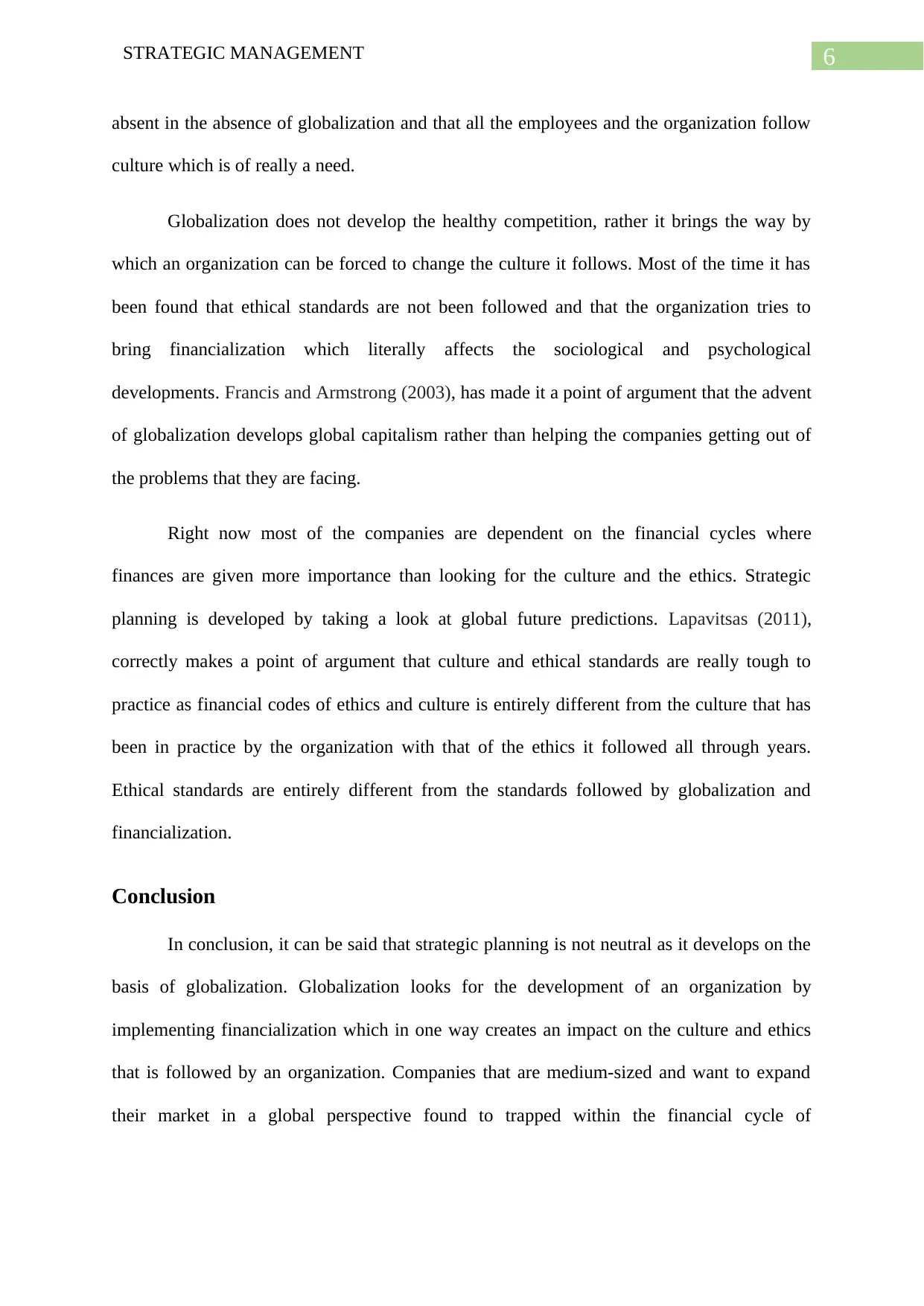
6STRATEGIC MANAGEMENT
absent in the absence of globalization and that all the employees and the organization follow
culture which is of really a need.
Globalization does not develop the healthy competition, rather it brings the way by
which an organization can be forced to change the culture it follows. Most of the time it has
been found that ethical standards are not been followed and that the organization tries to
bring financialization which literally affects the sociological and psychological
developments. Francis and Armstrong (2003), has made it a point of argument that the advent
of globalization develops global capitalism rather than helping the companies getting out of
the problems that they are facing.
Right now most of the companies are dependent on the financial cycles where
finances are given more importance than looking for the culture and the ethics. Strategic
planning is developed by taking a look at global future predictions. Lapavitsas (2011),
correctly makes a point of argument that culture and ethical standards are really tough to
practice as financial codes of ethics and culture is entirely different from the culture that has
been in practice by the organization with that of the ethics it followed all through years.
Ethical standards are entirely different from the standards followed by globalization and
financialization.
Conclusion
In conclusion, it can be said that strategic planning is not neutral as it develops on the
basis of globalization. Globalization looks for the development of an organization by
implementing financialization which in one way creates an impact on the culture and ethics
that is followed by an organization. Companies that are medium-sized and want to expand
their market in a global perspective found to trapped within the financial cycle of
absent in the absence of globalization and that all the employees and the organization follow
culture which is of really a need.
Globalization does not develop the healthy competition, rather it brings the way by
which an organization can be forced to change the culture it follows. Most of the time it has
been found that ethical standards are not been followed and that the organization tries to
bring financialization which literally affects the sociological and psychological
developments. Francis and Armstrong (2003), has made it a point of argument that the advent
of globalization develops global capitalism rather than helping the companies getting out of
the problems that they are facing.
Right now most of the companies are dependent on the financial cycles where
finances are given more importance than looking for the culture and the ethics. Strategic
planning is developed by taking a look at global future predictions. Lapavitsas (2011),
correctly makes a point of argument that culture and ethical standards are really tough to
practice as financial codes of ethics and culture is entirely different from the culture that has
been in practice by the organization with that of the ethics it followed all through years.
Ethical standards are entirely different from the standards followed by globalization and
financialization.
Conclusion
In conclusion, it can be said that strategic planning is not neutral as it develops on the
basis of globalization. Globalization looks for the development of an organization by
implementing financialization which in one way creates an impact on the culture and ethics
that is followed by an organization. Companies that are medium-sized and want to expand
their market in a global perspective found to trapped within the financial cycle of
Paraphrase This Document
Need a fresh take? Get an instant paraphrase of this document with our AI Paraphraser
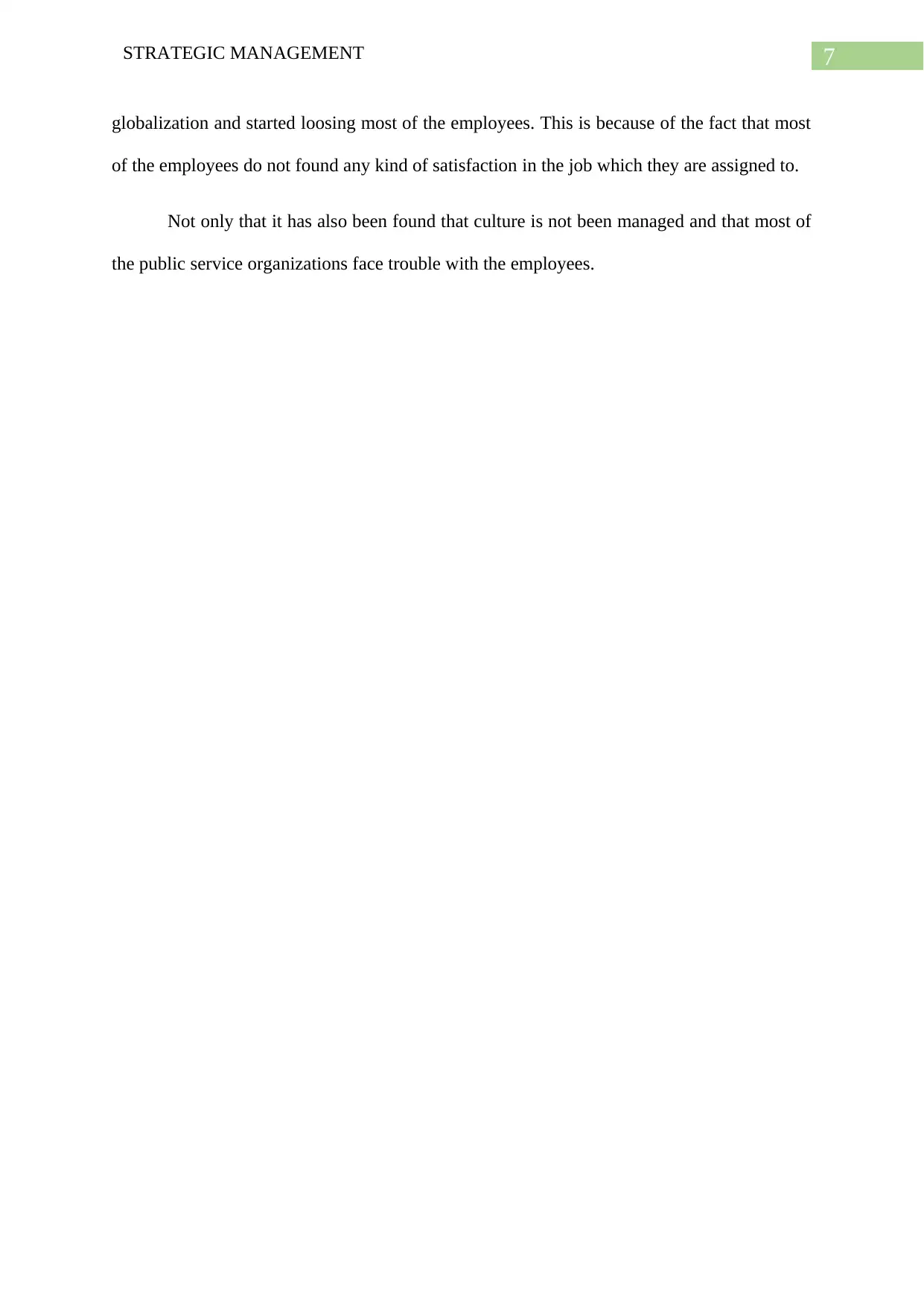
7STRATEGIC MANAGEMENT
globalization and started loosing most of the employees. This is because of the fact that most
of the employees do not found any kind of satisfaction in the job which they are assigned to.
Not only that it has also been found that culture is not been managed and that most of
the public service organizations face trouble with the employees.
globalization and started loosing most of the employees. This is because of the fact that most
of the employees do not found any kind of satisfaction in the job which they are assigned to.
Not only that it has also been found that culture is not been managed and that most of
the public service organizations face trouble with the employees.
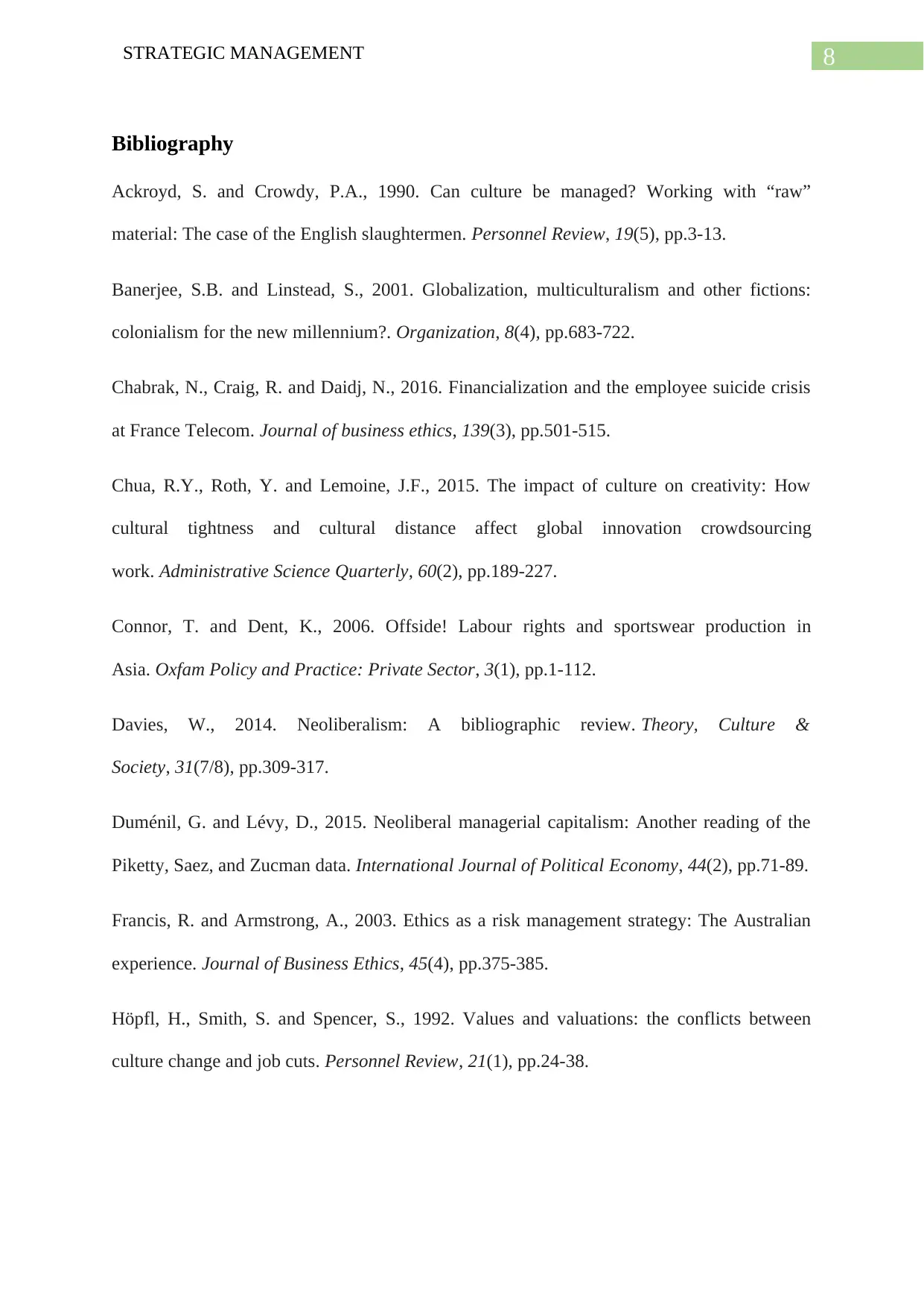
8STRATEGIC MANAGEMENT
Bibliography
Ackroyd, S. and Crowdy, P.A., 1990. Can culture be managed? Working with “raw”
material: The case of the English slaughtermen. Personnel Review, 19(5), pp.3-13.
Banerjee, S.B. and Linstead, S., 2001. Globalization, multiculturalism and other fictions:
colonialism for the new millennium?. Organization, 8(4), pp.683-722.
Chabrak, N., Craig, R. and Daidj, N., 2016. Financialization and the employee suicide crisis
at France Telecom. Journal of business ethics, 139(3), pp.501-515.
Chua, R.Y., Roth, Y. and Lemoine, J.F., 2015. The impact of culture on creativity: How
cultural tightness and cultural distance affect global innovation crowdsourcing
work. Administrative Science Quarterly, 60(2), pp.189-227.
Connor, T. and Dent, K., 2006. Offside! Labour rights and sportswear production in
Asia. Oxfam Policy and Practice: Private Sector, 3(1), pp.1-112.
Davies, W., 2014. Neoliberalism: A bibliographic review. Theory, Culture &
Society, 31(7/8), pp.309-317.
Duménil, G. and Lévy, D., 2015. Neoliberal managerial capitalism: Another reading of the
Piketty, Saez, and Zucman data. International Journal of Political Economy, 44(2), pp.71-89.
Francis, R. and Armstrong, A., 2003. Ethics as a risk management strategy: The Australian
experience. Journal of Business Ethics, 45(4), pp.375-385.
Höpfl, H., Smith, S. and Spencer, S., 1992. Values and valuations: the conflicts between
culture change and job cuts. Personnel Review, 21(1), pp.24-38.
Bibliography
Ackroyd, S. and Crowdy, P.A., 1990. Can culture be managed? Working with “raw”
material: The case of the English slaughtermen. Personnel Review, 19(5), pp.3-13.
Banerjee, S.B. and Linstead, S., 2001. Globalization, multiculturalism and other fictions:
colonialism for the new millennium?. Organization, 8(4), pp.683-722.
Chabrak, N., Craig, R. and Daidj, N., 2016. Financialization and the employee suicide crisis
at France Telecom. Journal of business ethics, 139(3), pp.501-515.
Chua, R.Y., Roth, Y. and Lemoine, J.F., 2015. The impact of culture on creativity: How
cultural tightness and cultural distance affect global innovation crowdsourcing
work. Administrative Science Quarterly, 60(2), pp.189-227.
Connor, T. and Dent, K., 2006. Offside! Labour rights and sportswear production in
Asia. Oxfam Policy and Practice: Private Sector, 3(1), pp.1-112.
Davies, W., 2014. Neoliberalism: A bibliographic review. Theory, Culture &
Society, 31(7/8), pp.309-317.
Duménil, G. and Lévy, D., 2015. Neoliberal managerial capitalism: Another reading of the
Piketty, Saez, and Zucman data. International Journal of Political Economy, 44(2), pp.71-89.
Francis, R. and Armstrong, A., 2003. Ethics as a risk management strategy: The Australian
experience. Journal of Business Ethics, 45(4), pp.375-385.
Höpfl, H., Smith, S. and Spencer, S., 1992. Values and valuations: the conflicts between
culture change and job cuts. Personnel Review, 21(1), pp.24-38.
⊘ This is a preview!⊘
Do you want full access?
Subscribe today to unlock all pages.

Trusted by 1+ million students worldwide
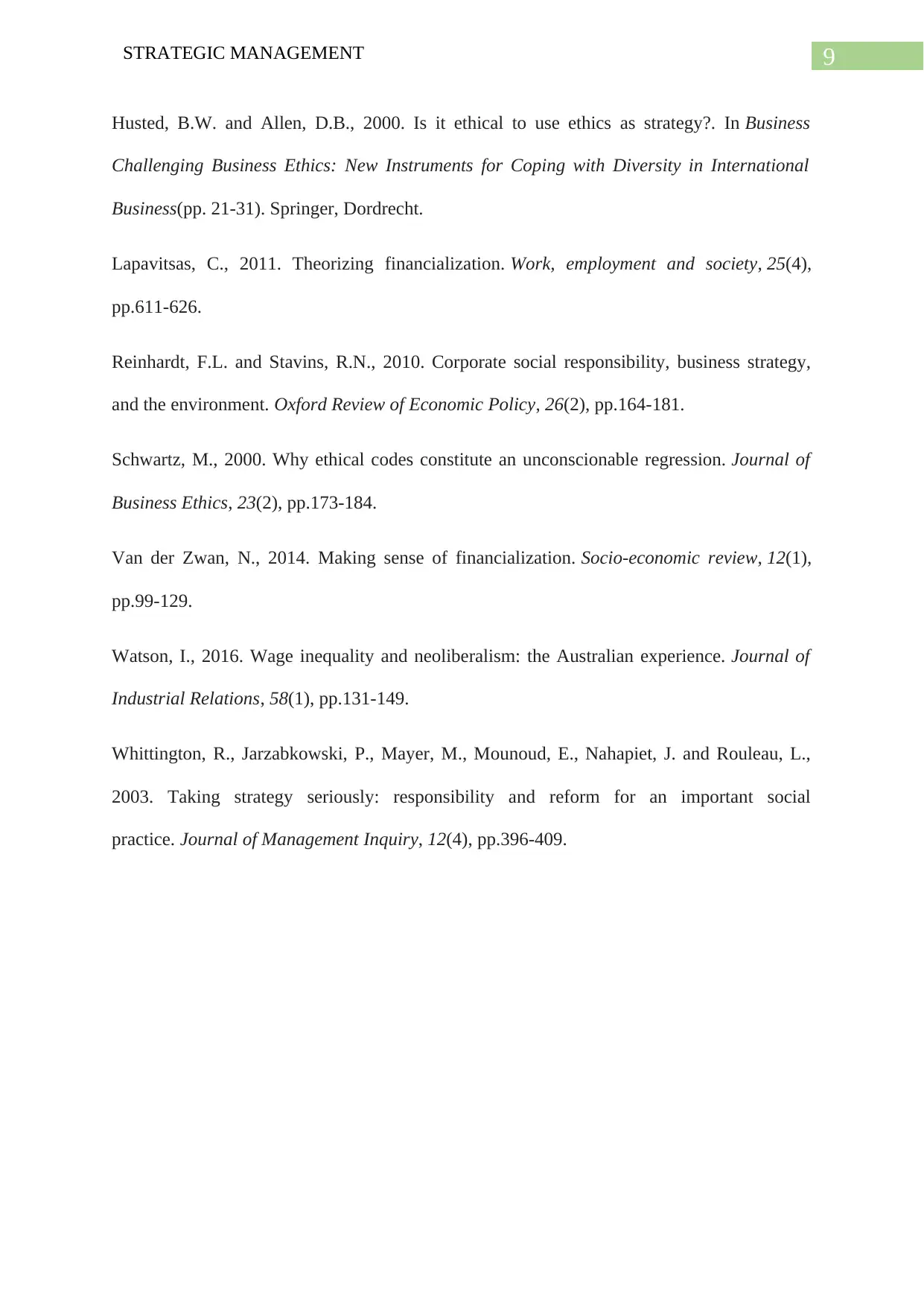
9STRATEGIC MANAGEMENT
Husted, B.W. and Allen, D.B., 2000. Is it ethical to use ethics as strategy?. In Business
Challenging Business Ethics: New Instruments for Coping with Diversity in International
Business(pp. 21-31). Springer, Dordrecht.
Lapavitsas, C., 2011. Theorizing financialization. Work, employment and society, 25(4),
pp.611-626.
Reinhardt, F.L. and Stavins, R.N., 2010. Corporate social responsibility, business strategy,
and the environment. Oxford Review of Economic Policy, 26(2), pp.164-181.
Schwartz, M., 2000. Why ethical codes constitute an unconscionable regression. Journal of
Business Ethics, 23(2), pp.173-184.
Van der Zwan, N., 2014. Making sense of financialization. Socio-economic review, 12(1),
pp.99-129.
Watson, I., 2016. Wage inequality and neoliberalism: the Australian experience. Journal of
Industrial Relations, 58(1), pp.131-149.
Whittington, R., Jarzabkowski, P., Mayer, M., Mounoud, E., Nahapiet, J. and Rouleau, L.,
2003. Taking strategy seriously: responsibility and reform for an important social
practice. Journal of Management Inquiry, 12(4), pp.396-409.
Husted, B.W. and Allen, D.B., 2000. Is it ethical to use ethics as strategy?. In Business
Challenging Business Ethics: New Instruments for Coping with Diversity in International
Business(pp. 21-31). Springer, Dordrecht.
Lapavitsas, C., 2011. Theorizing financialization. Work, employment and society, 25(4),
pp.611-626.
Reinhardt, F.L. and Stavins, R.N., 2010. Corporate social responsibility, business strategy,
and the environment. Oxford Review of Economic Policy, 26(2), pp.164-181.
Schwartz, M., 2000. Why ethical codes constitute an unconscionable regression. Journal of
Business Ethics, 23(2), pp.173-184.
Van der Zwan, N., 2014. Making sense of financialization. Socio-economic review, 12(1),
pp.99-129.
Watson, I., 2016. Wage inequality and neoliberalism: the Australian experience. Journal of
Industrial Relations, 58(1), pp.131-149.
Whittington, R., Jarzabkowski, P., Mayer, M., Mounoud, E., Nahapiet, J. and Rouleau, L.,
2003. Taking strategy seriously: responsibility and reform for an important social
practice. Journal of Management Inquiry, 12(4), pp.396-409.
1 out of 10
Related Documents
Your All-in-One AI-Powered Toolkit for Academic Success.
+13062052269
info@desklib.com
Available 24*7 on WhatsApp / Email
![[object Object]](/_next/static/media/star-bottom.7253800d.svg)
Unlock your academic potential
Copyright © 2020–2026 A2Z Services. All Rights Reserved. Developed and managed by ZUCOL.




